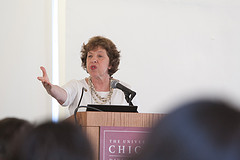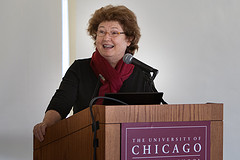Marianne Schmink
Professor, Center for Latin American Studies and Anthropology. Director, Program for Tropical Conservation and Development, University of Florida - Gainesville, FL
Amazon Forest Citizens: Work, Life, and Hope in Rio Branco, Acre 1989-2004
An important part of the legacy of Chico Mendes is seen in the development vision and policies of the Forest Government in the state of Acre, with their strong emphasis on raising people’s self-esteem and supporting local history and culture, alongside infrastructural development and heavy investments in education to support forest-based development. “Forest Citizenship” (Florestania) is the goal. This paper discusses the initial impacts of these policies on the citi-zens of the state capital, Rio Branco. Data collected from a random sample of the city’s households in 1989, 1994, 1999 and 2004 reveal significant changes in employment, income, quality of life, and perspectives for the future. These changes — shift to wage employment, falling incomes, improved material quality of life, and a hopeful perspective — disproportionately favored those with the highest incomes who were most able to take advantage of new opportunities following road paving and development investments. Income distribution persisted (as elsewhere in Brazil) but the general population was significantly more hopeful about future policy directions and their own lives. As Amazonia becomes increasingly urbanized, the relatively youthful populations of cities represent the future of the region.
Marianne Schmink is Professor of Latin American Studies and Anthropology at the University of Florida, where she is Director of the Tropical Conservation and Development (TCD) program. She has co-authored (with Charles H. Wood) Contested Frontiers in Amazonia (Columbia University Press, 1992), to be published in Portuguese in 2009 (UFPa) as Conflito Social e a Formação da Amazônia: a Expansão das Fronteiras no Sul do Pará, She has also co-authored (with Mâncio Lima Cordeiro) Rio Branco: A Cidade da Florestania (published in 2009 by UFPa/UFAC), in addition to three edited books, and over fifty articles, book chapters, and reports. Since 1986, Dr. Schmink has directed a major collaborative program in Acre with the Federal University of ACRE (UFAC) and non-governmental organizations including PESACRE and CTA.




